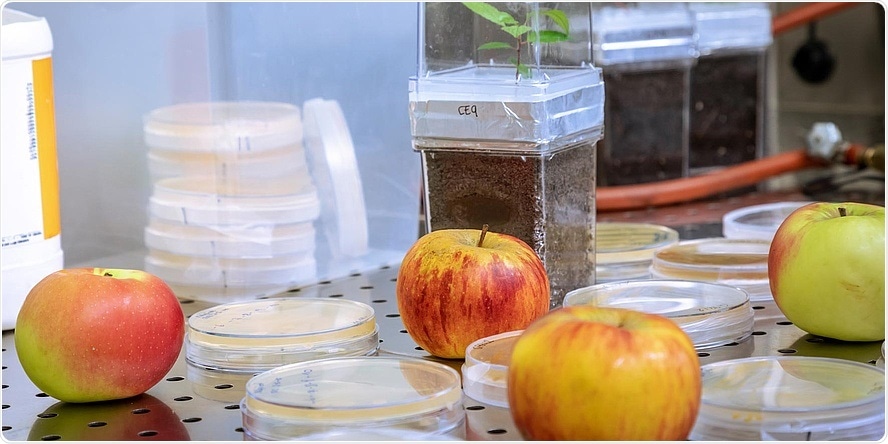The global changes resulting from human activities have posed an enormous challenge for agriculture. Severe weather events, drought, emerging pathogens, and record temperatures threaten the global food supply. Hence there is a need to make the crops more robust without polluting the environment further.

A study led by TU Graz is providing evidence for the co-evolution of plants and microorganisms. Image Credit: © Lunghammer–Graz University of Technology
Microbiome research and management provide much potential to accomplish these goals. Recent research carried out by an international team headed by Graz University of Technology (TU Graz) unwinds novel perspectives in the area.
The study was published in the New Phytologist scientific journal.
The importance of the microbiome for living organisms
Microbiome research is just a few decades old and has created some ground-breaking findings. One breakthrough is that animals, humans, and plants have particularly adapted microbiomes that have taken over vital functions.
Both the microbiome and the organism have evolved in co-evolution—in mutual influence. The current research confirmed the same. All organisms are considered to be “holobionts”—collectively functioning units with various specialized microbes. The organisms are always numerically superior—for instance, humans harbor 10 times more microbes than their cells.
The microbiome is hence classified as a vital target for novel health therapies and prophylaxis. This is also true for cultivated plants; however, the potential is less explored.
Confirmation of the coevolution theory
The interdisciplinary group of scientists compared the microbiome of modern domesticated apple crops—explicitly bred and cultivated varieties—with the microbiome of their wild ancestors and with the microbiome of closely related species.
The researchers used molecular analyses and bioinformatic techniques to evaluate for the first time that the microbiome is inherited similarly to genes. Genetically similar apples also harbor similar microbiome. Astonishingly, the modern apple varieties have some microbiome from their wild ancestors.
The research reveals that the microbiome is also “bred” and has largely changed with time. To date this occurrence was unintentional and numerous microbes were lost in the process.
These microbes that were lost can help the crops suitable for climate change again, as the focus of breeding has changed from the sweetness and size of the apples to health and resilience. The researchers are confident that the microbiome of the wild ancestors from the Inner-Asian Tien Shan mountain range has beneficial microbes for this purpose.
Useful research results for agriculture
The results clarify a long scientific debate and lay the groundwork for new ecological strategies in plant breeding.”
Ahmed Abdelfattah, Study First Author, Institute of Environmental Biotechnology
It would be possible, for instance, to alter the plant microbiome by introducing microbes in a targeted manner to boost plant resistance. This is the focus of the Institute of Environmental Biotechnology at TU Graz, and Marie Curie Fellow Ahmed Abdelfattah chose it as a research location because of its expertise in microbiome biotechnology.
My apple microbiome journey started during my visit, as PhD student, to Dr. Michael Wisniewski’s lab in 2015.”
Ahmed Abdelfattah, Study First Author, Institute of Environmental Biotechnology
Wisniewski, the last author of the article and the study with whom the actual experiment was designed, is a professor at Virginia Tech with a long-standing scientific contribution to fruit research.
Institute head Gabriele Berg and her group anticipates is to utilize this new understanding for plant health, humans, and the planet. The apple is just a sign as it was many times in human history.
Source:
Journal reference:
Abdelfattah, A., et al. (2021) Evidence for host–microbiome co-evolution in apple. New Phytologist. doi.org/10.1111/nph.17820.